Nursing Ethics and Legal Framework
VerifiedAdded on 2020/02/24
|13
|2985
|348
AI Summary
This assignment delves into the complex world of nursing ethics and its legal underpinnings. Students will analyze various ethical principles guiding nursing practice, such as autonomy, beneficence, non-maleficence, and justice. Furthermore, the assignment examines the legal framework governing nursing, encompassing issues like scope of practice, informed consent, vicarious liability, and professional accountability. Case studies and real-world examples are likely to be incorporated to illustrate these concepts and their practical implications.
Contribute Materials
Your contribution can guide someone’s learning journey. Share your
documents today.
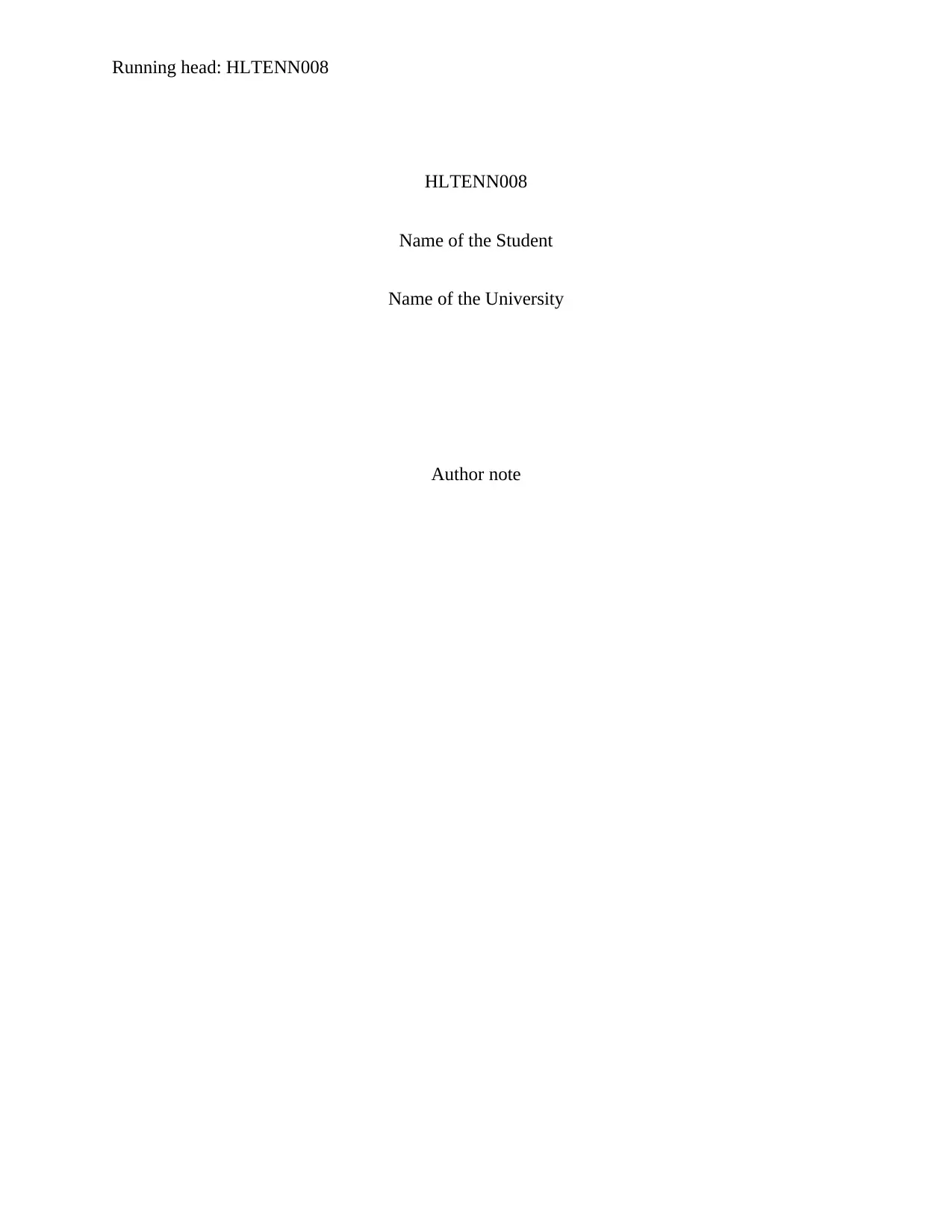
Running head: HLTENN008
HLTENN008
Name of the Student
Name of the University
Author note
HLTENN008
Name of the Student
Name of the University
Author note
Secure Best Marks with AI Grader
Need help grading? Try our AI Grader for instant feedback on your assignments.
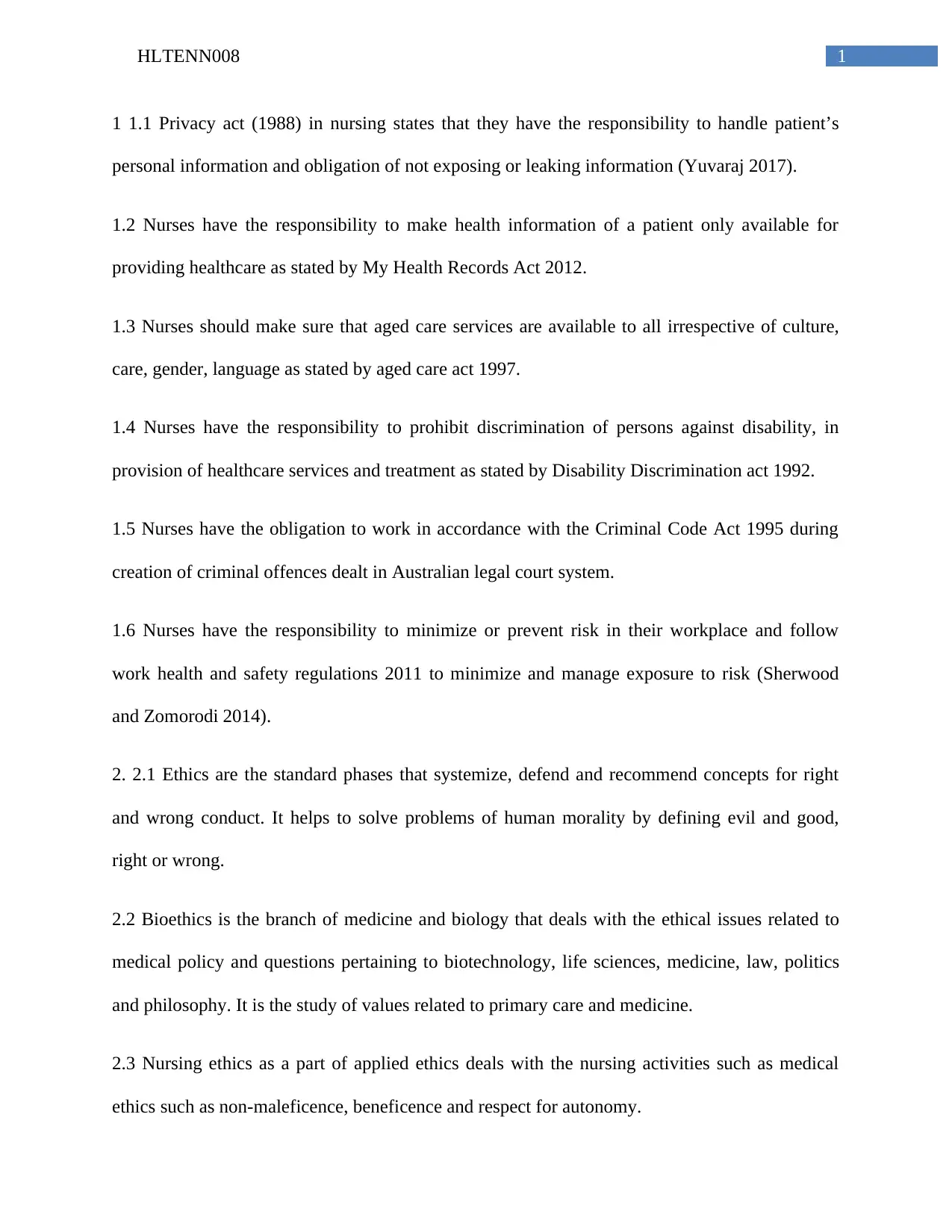
1HLTENN008
1 1.1 Privacy act (1988) in nursing states that they have the responsibility to handle patient’s
personal information and obligation of not exposing or leaking information (Yuvaraj 2017).
1.2 Nurses have the responsibility to make health information of a patient only available for
providing healthcare as stated by My Health Records Act 2012.
1.3 Nurses should make sure that aged care services are available to all irrespective of culture,
care, gender, language as stated by aged care act 1997.
1.4 Nurses have the responsibility to prohibit discrimination of persons against disability, in
provision of healthcare services and treatment as stated by Disability Discrimination act 1992.
1.5 Nurses have the obligation to work in accordance with the Criminal Code Act 1995 during
creation of criminal offences dealt in Australian legal court system.
1.6 Nurses have the responsibility to minimize or prevent risk in their workplace and follow
work health and safety regulations 2011 to minimize and manage exposure to risk (Sherwood
and Zomorodi 2014).
2. 2.1 Ethics are the standard phases that systemize, defend and recommend concepts for right
and wrong conduct. It helps to solve problems of human morality by defining evil and good,
right or wrong.
2.2 Bioethics is the branch of medicine and biology that deals with the ethical issues related to
medical policy and questions pertaining to biotechnology, life sciences, medicine, law, politics
and philosophy. It is the study of values related to primary care and medicine.
2.3 Nursing ethics as a part of applied ethics deals with the nursing activities such as medical
ethics such as non-maleficence, beneficence and respect for autonomy.
1 1.1 Privacy act (1988) in nursing states that they have the responsibility to handle patient’s
personal information and obligation of not exposing or leaking information (Yuvaraj 2017).
1.2 Nurses have the responsibility to make health information of a patient only available for
providing healthcare as stated by My Health Records Act 2012.
1.3 Nurses should make sure that aged care services are available to all irrespective of culture,
care, gender, language as stated by aged care act 1997.
1.4 Nurses have the responsibility to prohibit discrimination of persons against disability, in
provision of healthcare services and treatment as stated by Disability Discrimination act 1992.
1.5 Nurses have the obligation to work in accordance with the Criminal Code Act 1995 during
creation of criminal offences dealt in Australian legal court system.
1.6 Nurses have the responsibility to minimize or prevent risk in their workplace and follow
work health and safety regulations 2011 to minimize and manage exposure to risk (Sherwood
and Zomorodi 2014).
2. 2.1 Ethics are the standard phases that systemize, defend and recommend concepts for right
and wrong conduct. It helps to solve problems of human morality by defining evil and good,
right or wrong.
2.2 Bioethics is the branch of medicine and biology that deals with the ethical issues related to
medical policy and questions pertaining to biotechnology, life sciences, medicine, law, politics
and philosophy. It is the study of values related to primary care and medicine.
2.3 Nursing ethics as a part of applied ethics deals with the nursing activities such as medical
ethics such as non-maleficence, beneficence and respect for autonomy.
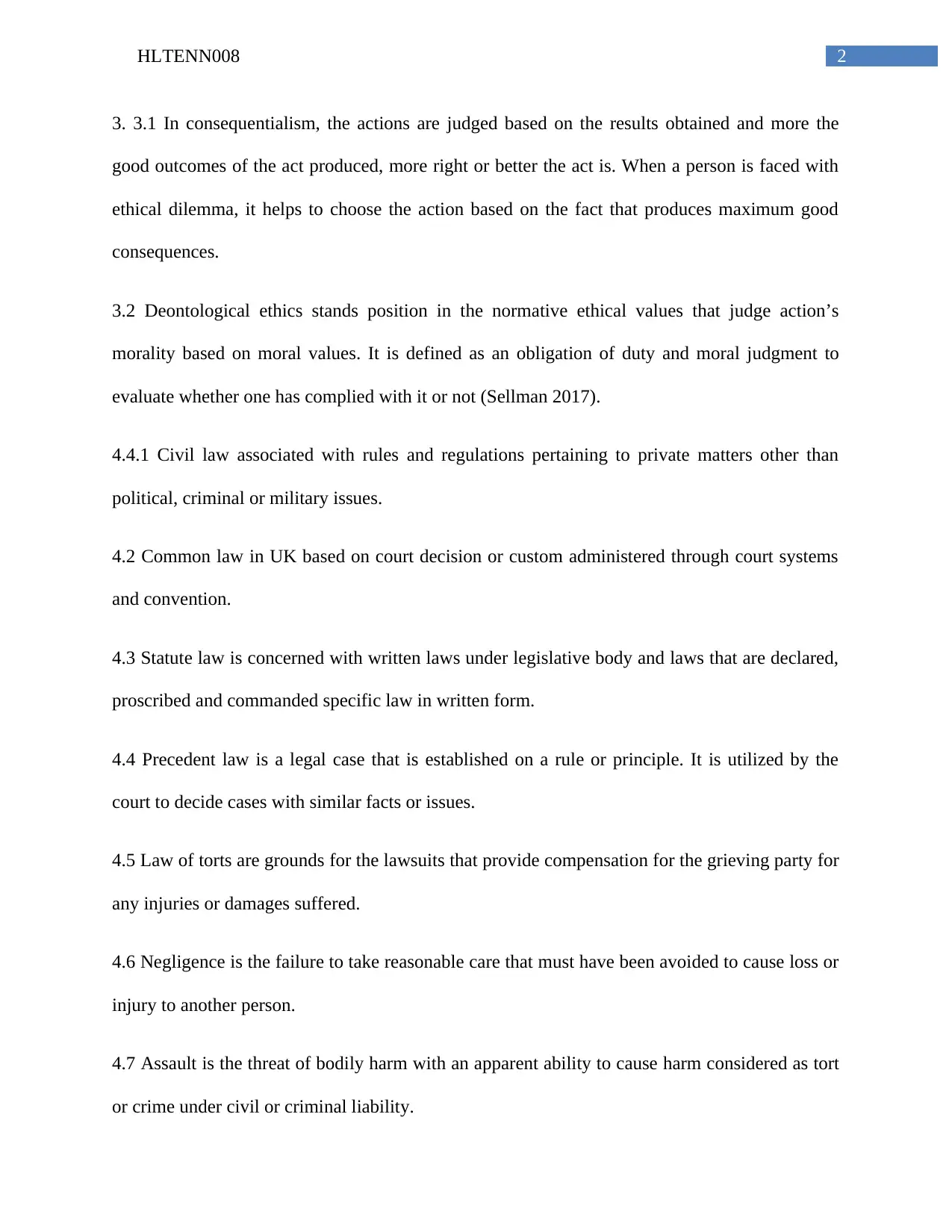
2HLTENN008
3. 3.1 In consequentialism, the actions are judged based on the results obtained and more the
good outcomes of the act produced, more right or better the act is. When a person is faced with
ethical dilemma, it helps to choose the action based on the fact that produces maximum good
consequences.
3.2 Deontological ethics stands position in the normative ethical values that judge action’s
morality based on moral values. It is defined as an obligation of duty and moral judgment to
evaluate whether one has complied with it or not (Sellman 2017).
4.4.1 Civil law associated with rules and regulations pertaining to private matters other than
political, criminal or military issues.
4.2 Common law in UK based on court decision or custom administered through court systems
and convention.
4.3 Statute law is concerned with written laws under legislative body and laws that are declared,
proscribed and commanded specific law in written form.
4.4 Precedent law is a legal case that is established on a rule or principle. It is utilized by the
court to decide cases with similar facts or issues.
4.5 Law of torts are grounds for the lawsuits that provide compensation for the grieving party for
any injuries or damages suffered.
4.6 Negligence is the failure to take reasonable care that must have been avoided to cause loss or
injury to another person.
4.7 Assault is the threat of bodily harm with an apparent ability to cause harm considered as tort
or crime under civil or criminal liability.
3. 3.1 In consequentialism, the actions are judged based on the results obtained and more the
good outcomes of the act produced, more right or better the act is. When a person is faced with
ethical dilemma, it helps to choose the action based on the fact that produces maximum good
consequences.
3.2 Deontological ethics stands position in the normative ethical values that judge action’s
morality based on moral values. It is defined as an obligation of duty and moral judgment to
evaluate whether one has complied with it or not (Sellman 2017).
4.4.1 Civil law associated with rules and regulations pertaining to private matters other than
political, criminal or military issues.
4.2 Common law in UK based on court decision or custom administered through court systems
and convention.
4.3 Statute law is concerned with written laws under legislative body and laws that are declared,
proscribed and commanded specific law in written form.
4.4 Precedent law is a legal case that is established on a rule or principle. It is utilized by the
court to decide cases with similar facts or issues.
4.5 Law of torts are grounds for the lawsuits that provide compensation for the grieving party for
any injuries or damages suffered.
4.6 Negligence is the failure to take reasonable care that must have been avoided to cause loss or
injury to another person.
4.7 Assault is the threat of bodily harm with an apparent ability to cause harm considered as tort
or crime under civil or criminal liability.
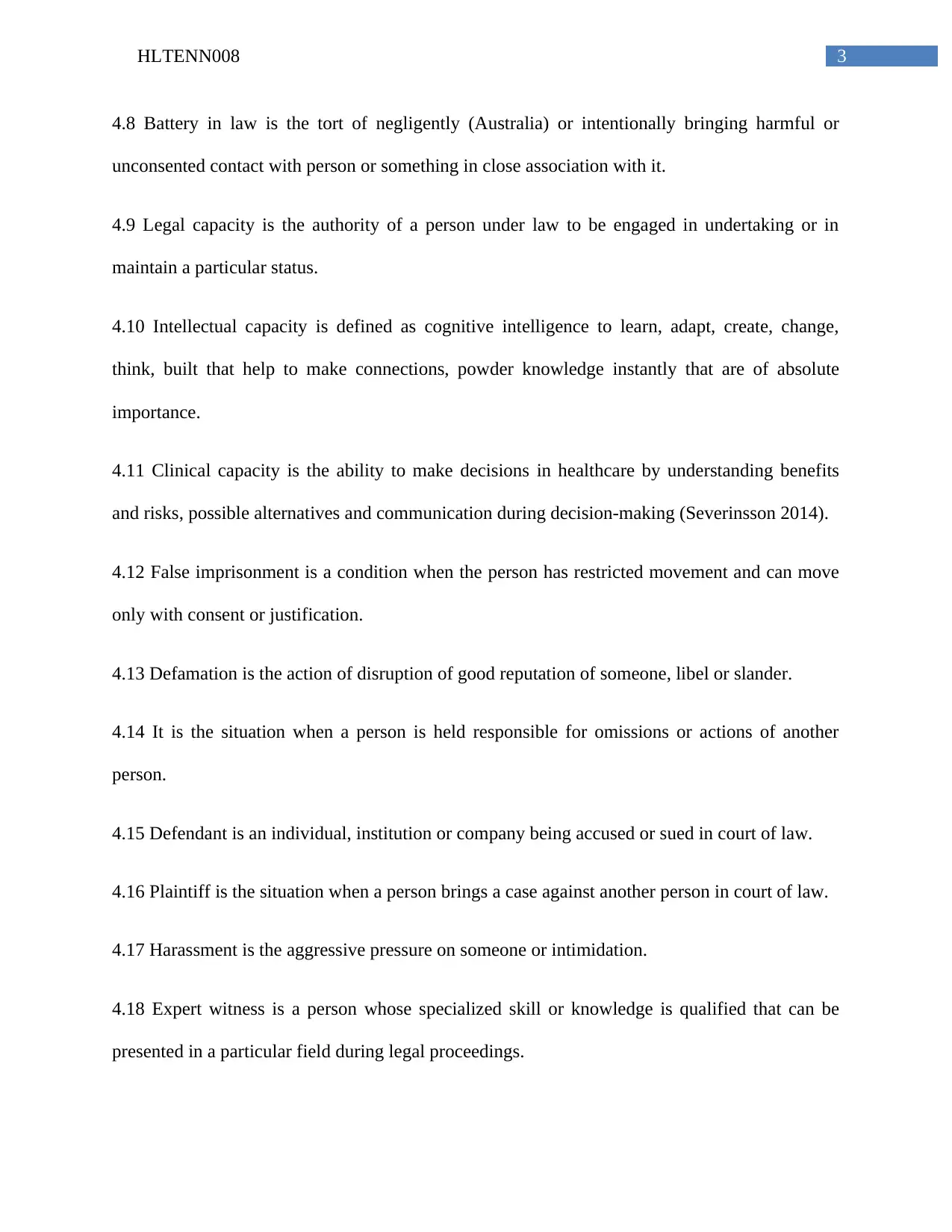
3HLTENN008
4.8 Battery in law is the tort of negligently (Australia) or intentionally bringing harmful or
unconsented contact with person or something in close association with it.
4.9 Legal capacity is the authority of a person under law to be engaged in undertaking or in
maintain a particular status.
4.10 Intellectual capacity is defined as cognitive intelligence to learn, adapt, create, change,
think, built that help to make connections, powder knowledge instantly that are of absolute
importance.
4.11 Clinical capacity is the ability to make decisions in healthcare by understanding benefits
and risks, possible alternatives and communication during decision-making (Severinsson 2014).
4.12 False imprisonment is a condition when the person has restricted movement and can move
only with consent or justification.
4.13 Defamation is the action of disruption of good reputation of someone, libel or slander.
4.14 It is the situation when a person is held responsible for omissions or actions of another
person.
4.15 Defendant is an individual, institution or company being accused or sued in court of law.
4.16 Plaintiff is the situation when a person brings a case against another person in court of law.
4.17 Harassment is the aggressive pressure on someone or intimidation.
4.18 Expert witness is a person whose specialized skill or knowledge is qualified that can be
presented in a particular field during legal proceedings.
4.8 Battery in law is the tort of negligently (Australia) or intentionally bringing harmful or
unconsented contact with person or something in close association with it.
4.9 Legal capacity is the authority of a person under law to be engaged in undertaking or in
maintain a particular status.
4.10 Intellectual capacity is defined as cognitive intelligence to learn, adapt, create, change,
think, built that help to make connections, powder knowledge instantly that are of absolute
importance.
4.11 Clinical capacity is the ability to make decisions in healthcare by understanding benefits
and risks, possible alternatives and communication during decision-making (Severinsson 2014).
4.12 False imprisonment is a condition when the person has restricted movement and can move
only with consent or justification.
4.13 Defamation is the action of disruption of good reputation of someone, libel or slander.
4.14 It is the situation when a person is held responsible for omissions or actions of another
person.
4.15 Defendant is an individual, institution or company being accused or sued in court of law.
4.16 Plaintiff is the situation when a person brings a case against another person in court of law.
4.17 Harassment is the aggressive pressure on someone or intimidation.
4.18 Expert witness is a person whose specialized skill or knowledge is qualified that can be
presented in a particular field during legal proceedings.
Secure Best Marks with AI Grader
Need help grading? Try our AI Grader for instant feedback on your assignments.
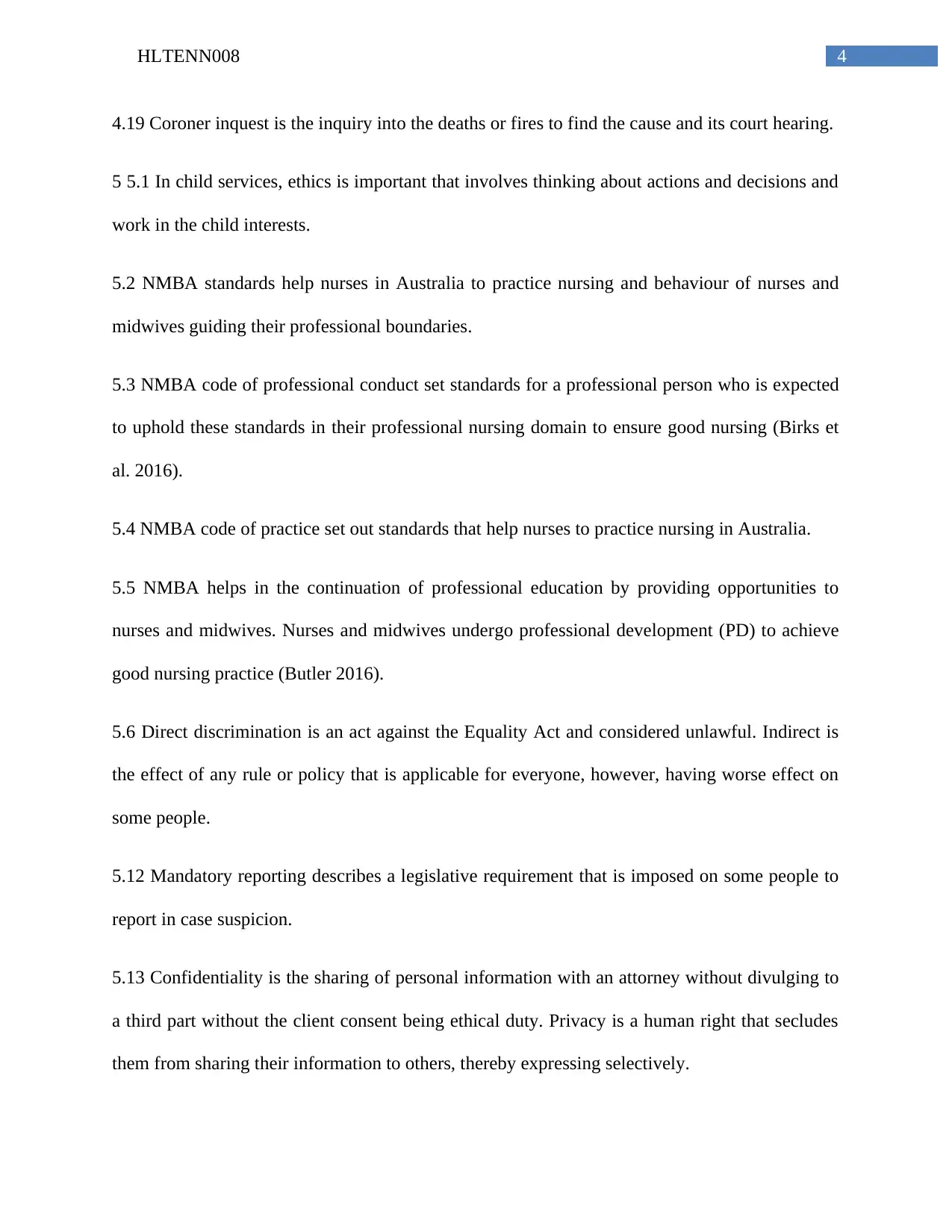
4HLTENN008
4.19 Coroner inquest is the inquiry into the deaths or fires to find the cause and its court hearing.
5 5.1 In child services, ethics is important that involves thinking about actions and decisions and
work in the child interests.
5.2 NMBA standards help nurses in Australia to practice nursing and behaviour of nurses and
midwives guiding their professional boundaries.
5.3 NMBA code of professional conduct set standards for a professional person who is expected
to uphold these standards in their professional nursing domain to ensure good nursing (Birks et
al. 2016).
5.4 NMBA code of practice set out standards that help nurses to practice nursing in Australia.
5.5 NMBA helps in the continuation of professional education by providing opportunities to
nurses and midwives. Nurses and midwives undergo professional development (PD) to achieve
good nursing practice (Butler 2016).
5.6 Direct discrimination is an act against the Equality Act and considered unlawful. Indirect is
the effect of any rule or policy that is applicable for everyone, however, having worse effect on
some people.
5.12 Mandatory reporting describes a legislative requirement that is imposed on some people to
report in case suspicion.
5.13 Confidentiality is the sharing of personal information with an attorney without divulging to
a third part without the client consent being ethical duty. Privacy is a human right that secludes
them from sharing their information to others, thereby expressing selectively.
4.19 Coroner inquest is the inquiry into the deaths or fires to find the cause and its court hearing.
5 5.1 In child services, ethics is important that involves thinking about actions and decisions and
work in the child interests.
5.2 NMBA standards help nurses in Australia to practice nursing and behaviour of nurses and
midwives guiding their professional boundaries.
5.3 NMBA code of professional conduct set standards for a professional person who is expected
to uphold these standards in their professional nursing domain to ensure good nursing (Birks et
al. 2016).
5.4 NMBA code of practice set out standards that help nurses to practice nursing in Australia.
5.5 NMBA helps in the continuation of professional education by providing opportunities to
nurses and midwives. Nurses and midwives undergo professional development (PD) to achieve
good nursing practice (Butler 2016).
5.6 Direct discrimination is an act against the Equality Act and considered unlawful. Indirect is
the effect of any rule or policy that is applicable for everyone, however, having worse effect on
some people.
5.12 Mandatory reporting describes a legislative requirement that is imposed on some people to
report in case suspicion.
5.13 Confidentiality is the sharing of personal information with an attorney without divulging to
a third part without the client consent being ethical duty. Privacy is a human right that secludes
them from sharing their information to others, thereby expressing selectively.
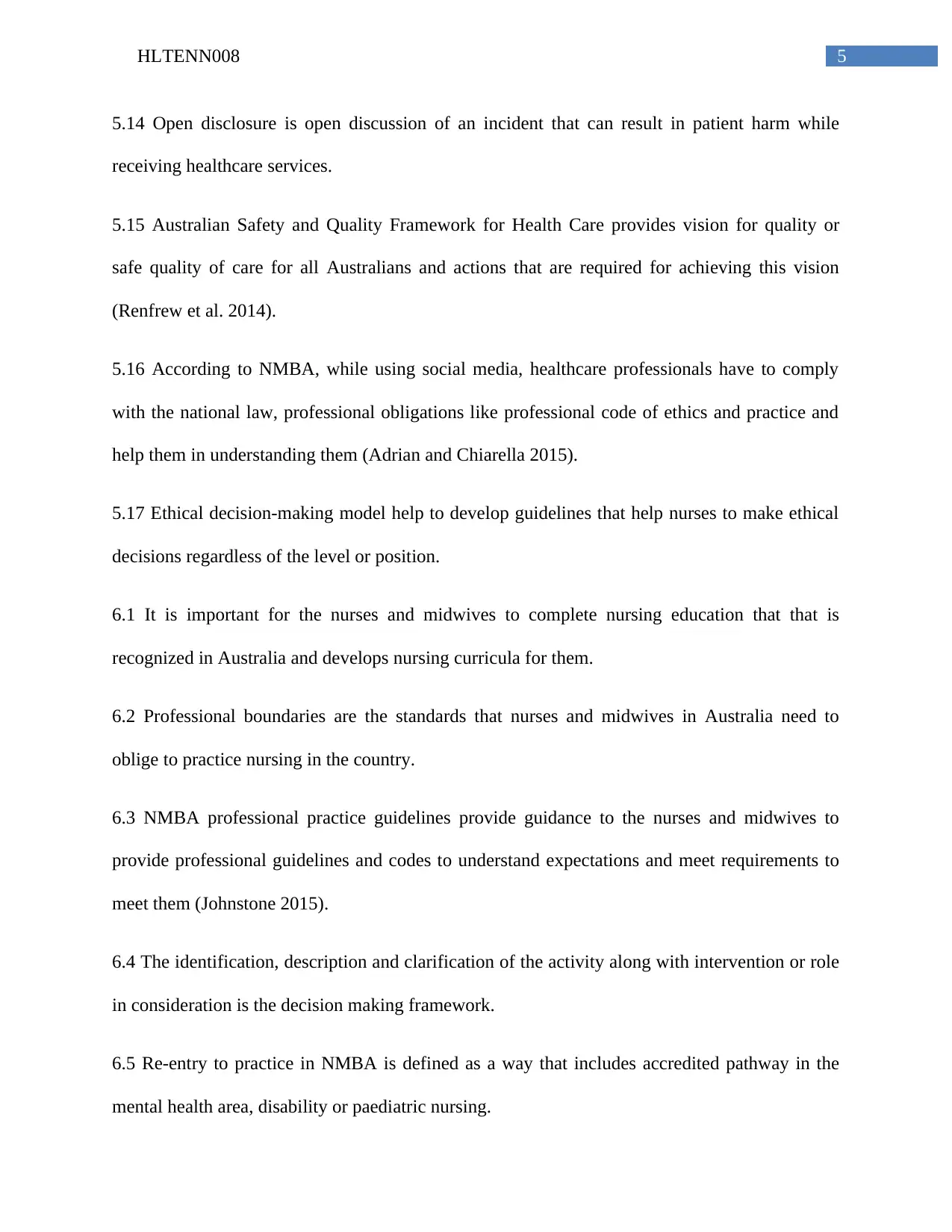
5HLTENN008
5.14 Open disclosure is open discussion of an incident that can result in patient harm while
receiving healthcare services.
5.15 Australian Safety and Quality Framework for Health Care provides vision for quality or
safe quality of care for all Australians and actions that are required for achieving this vision
(Renfrew et al. 2014).
5.16 According to NMBA, while using social media, healthcare professionals have to comply
with the national law, professional obligations like professional code of ethics and practice and
help them in understanding them (Adrian and Chiarella 2015).
5.17 Ethical decision-making model help to develop guidelines that help nurses to make ethical
decisions regardless of the level or position.
6.1 It is important for the nurses and midwives to complete nursing education that that is
recognized in Australia and develops nursing curricula for them.
6.2 Professional boundaries are the standards that nurses and midwives in Australia need to
oblige to practice nursing in the country.
6.3 NMBA professional practice guidelines provide guidance to the nurses and midwives to
provide professional guidelines and codes to understand expectations and meet requirements to
meet them (Johnstone 2015).
6.4 The identification, description and clarification of the activity along with intervention or role
in consideration is the decision making framework.
6.5 Re-entry to practice in NMBA is defined as a way that includes accredited pathway in the
mental health area, disability or paediatric nursing.
5.14 Open disclosure is open discussion of an incident that can result in patient harm while
receiving healthcare services.
5.15 Australian Safety and Quality Framework for Health Care provides vision for quality or
safe quality of care for all Australians and actions that are required for achieving this vision
(Renfrew et al. 2014).
5.16 According to NMBA, while using social media, healthcare professionals have to comply
with the national law, professional obligations like professional code of ethics and practice and
help them in understanding them (Adrian and Chiarella 2015).
5.17 Ethical decision-making model help to develop guidelines that help nurses to make ethical
decisions regardless of the level or position.
6.1 It is important for the nurses and midwives to complete nursing education that that is
recognized in Australia and develops nursing curricula for them.
6.2 Professional boundaries are the standards that nurses and midwives in Australia need to
oblige to practice nursing in the country.
6.3 NMBA professional practice guidelines provide guidance to the nurses and midwives to
provide professional guidelines and codes to understand expectations and meet requirements to
meet them (Johnstone 2015).
6.4 The identification, description and clarification of the activity along with intervention or role
in consideration is the decision making framework.
6.5 Re-entry to practice in NMBA is defined as a way that includes accredited pathway in the
mental health area, disability or paediatric nursing.
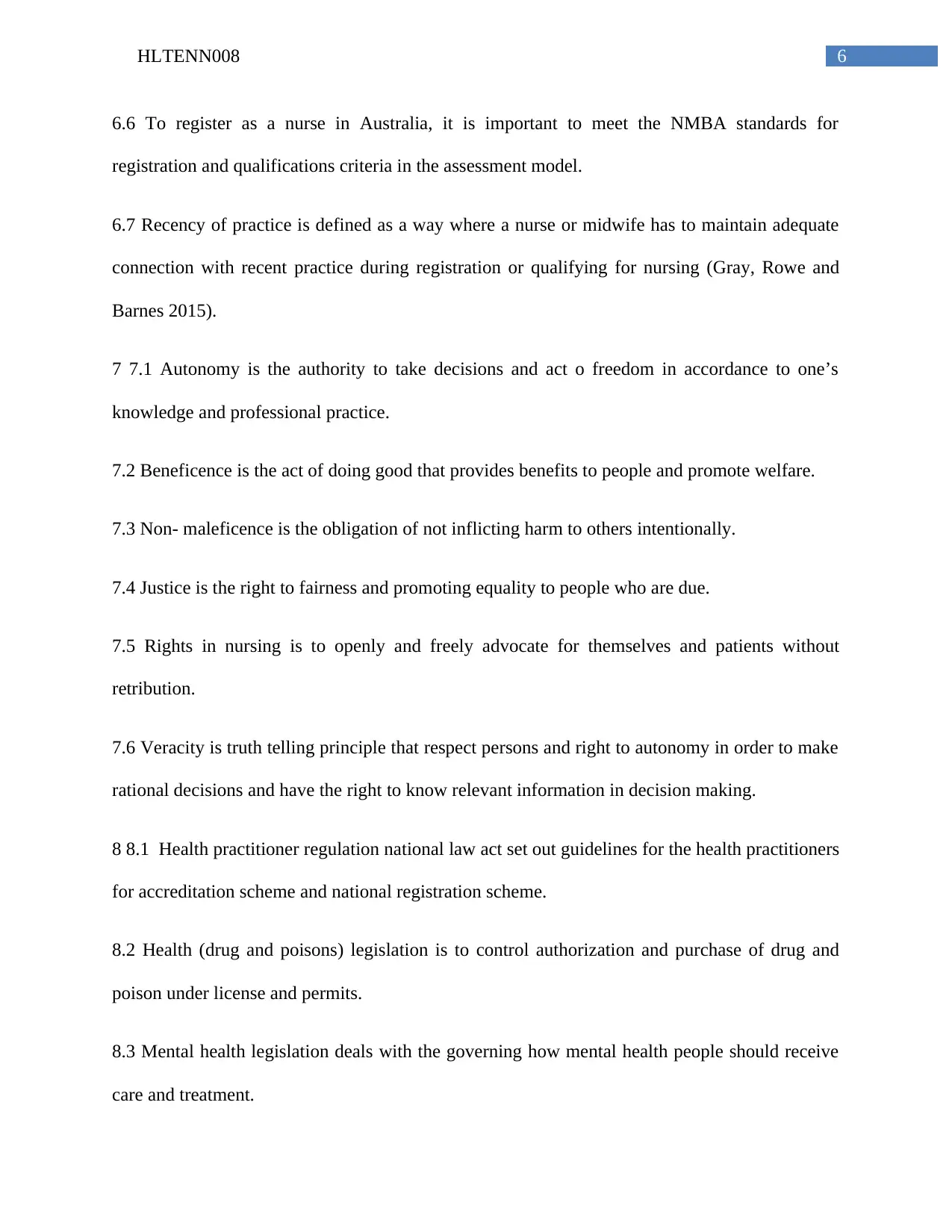
6HLTENN008
6.6 To register as a nurse in Australia, it is important to meet the NMBA standards for
registration and qualifications criteria in the assessment model.
6.7 Recency of practice is defined as a way where a nurse or midwife has to maintain adequate
connection with recent practice during registration or qualifying for nursing (Gray, Rowe and
Barnes 2015).
7 7.1 Autonomy is the authority to take decisions and act o freedom in accordance to one’s
knowledge and professional practice.
7.2 Beneficence is the act of doing good that provides benefits to people and promote welfare.
7.3 Non- maleficence is the obligation of not inflicting harm to others intentionally.
7.4 Justice is the right to fairness and promoting equality to people who are due.
7.5 Rights in nursing is to openly and freely advocate for themselves and patients without
retribution.
7.6 Veracity is truth telling principle that respect persons and right to autonomy in order to make
rational decisions and have the right to know relevant information in decision making.
8 8.1 Health practitioner regulation national law act set out guidelines for the health practitioners
for accreditation scheme and national registration scheme.
8.2 Health (drug and poisons) legislation is to control authorization and purchase of drug and
poison under license and permits.
8.3 Mental health legislation deals with the governing how mental health people should receive
care and treatment.
6.6 To register as a nurse in Australia, it is important to meet the NMBA standards for
registration and qualifications criteria in the assessment model.
6.7 Recency of practice is defined as a way where a nurse or midwife has to maintain adequate
connection with recent practice during registration or qualifying for nursing (Gray, Rowe and
Barnes 2015).
7 7.1 Autonomy is the authority to take decisions and act o freedom in accordance to one’s
knowledge and professional practice.
7.2 Beneficence is the act of doing good that provides benefits to people and promote welfare.
7.3 Non- maleficence is the obligation of not inflicting harm to others intentionally.
7.4 Justice is the right to fairness and promoting equality to people who are due.
7.5 Rights in nursing is to openly and freely advocate for themselves and patients without
retribution.
7.6 Veracity is truth telling principle that respect persons and right to autonomy in order to make
rational decisions and have the right to know relevant information in decision making.
8 8.1 Health practitioner regulation national law act set out guidelines for the health practitioners
for accreditation scheme and national registration scheme.
8.2 Health (drug and poisons) legislation is to control authorization and purchase of drug and
poison under license and permits.
8.3 Mental health legislation deals with the governing how mental health people should receive
care and treatment.
Paraphrase This Document
Need a fresh take? Get an instant paraphrase of this document with our AI Paraphraser
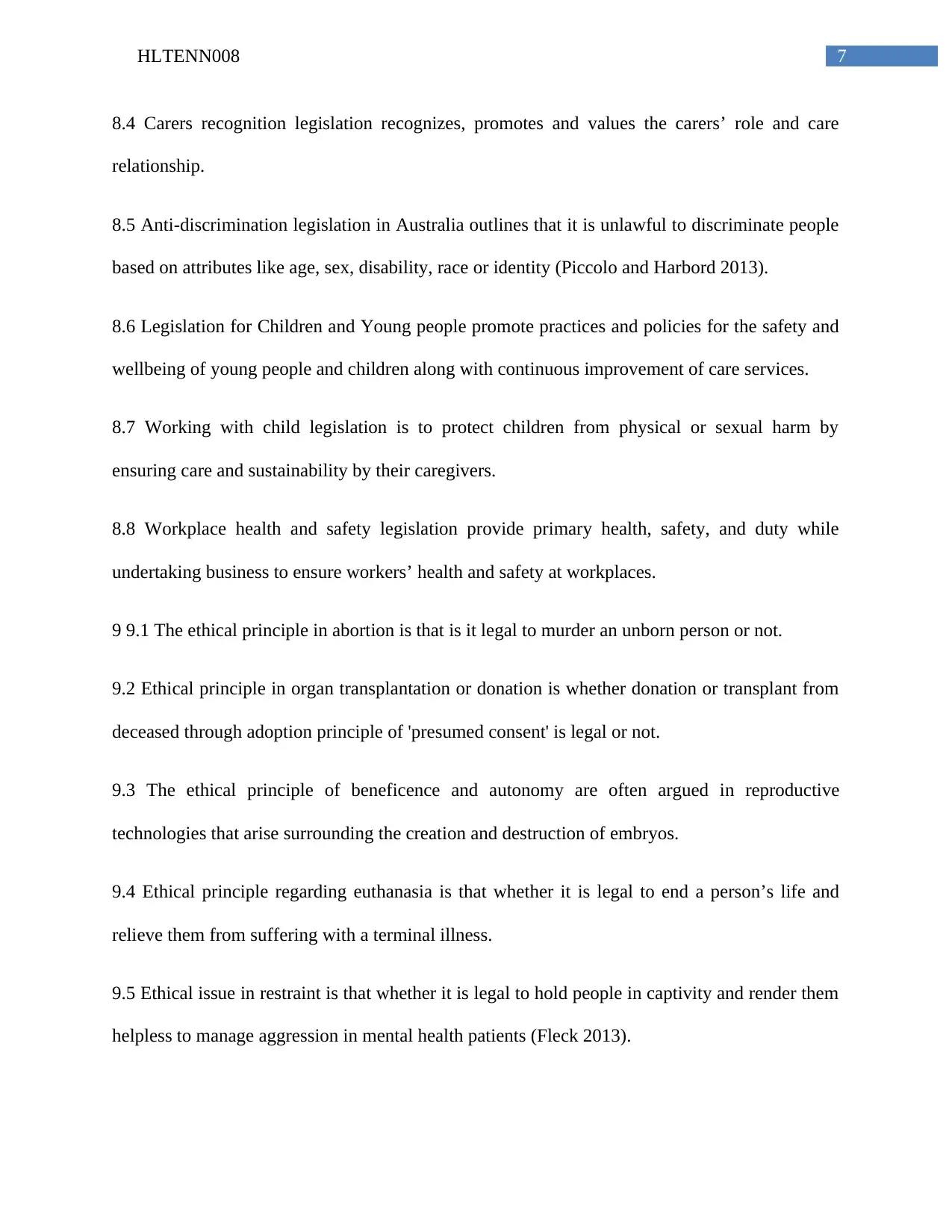
7HLTENN008
8.4 Carers recognition legislation recognizes, promotes and values the carers’ role and care
relationship.
8.5 Anti-discrimination legislation in Australia outlines that it is unlawful to discriminate people
based on attributes like age, sex, disability, race or identity (Piccolo and Harbord 2013).
8.6 Legislation for Children and Young people promote practices and policies for the safety and
wellbeing of young people and children along with continuous improvement of care services.
8.7 Working with child legislation is to protect children from physical or sexual harm by
ensuring care and sustainability by their caregivers.
8.8 Workplace health and safety legislation provide primary health, safety, and duty while
undertaking business to ensure workers’ health and safety at workplaces.
9 9.1 The ethical principle in abortion is that is it legal to murder an unborn person or not.
9.2 Ethical principle in organ transplantation or donation is whether donation or transplant from
deceased through adoption principle of 'presumed consent' is legal or not.
9.3 The ethical principle of beneficence and autonomy are often argued in reproductive
technologies that arise surrounding the creation and destruction of embryos.
9.4 Ethical principle regarding euthanasia is that whether it is legal to end a person’s life and
relieve them from suffering with a terminal illness.
9.5 Ethical issue in restraint is that whether it is legal to hold people in captivity and render them
helpless to manage aggression in mental health patients (Fleck 2013).
8.4 Carers recognition legislation recognizes, promotes and values the carers’ role and care
relationship.
8.5 Anti-discrimination legislation in Australia outlines that it is unlawful to discriminate people
based on attributes like age, sex, disability, race or identity (Piccolo and Harbord 2013).
8.6 Legislation for Children and Young people promote practices and policies for the safety and
wellbeing of young people and children along with continuous improvement of care services.
8.7 Working with child legislation is to protect children from physical or sexual harm by
ensuring care and sustainability by their caregivers.
8.8 Workplace health and safety legislation provide primary health, safety, and duty while
undertaking business to ensure workers’ health and safety at workplaces.
9 9.1 The ethical principle in abortion is that is it legal to murder an unborn person or not.
9.2 Ethical principle in organ transplantation or donation is whether donation or transplant from
deceased through adoption principle of 'presumed consent' is legal or not.
9.3 The ethical principle of beneficence and autonomy are often argued in reproductive
technologies that arise surrounding the creation and destruction of embryos.
9.4 Ethical principle regarding euthanasia is that whether it is legal to end a person’s life and
relieve them from suffering with a terminal illness.
9.5 Ethical issue in restraint is that whether it is legal to hold people in captivity and render them
helpless to manage aggression in mental health patients (Fleck 2013).
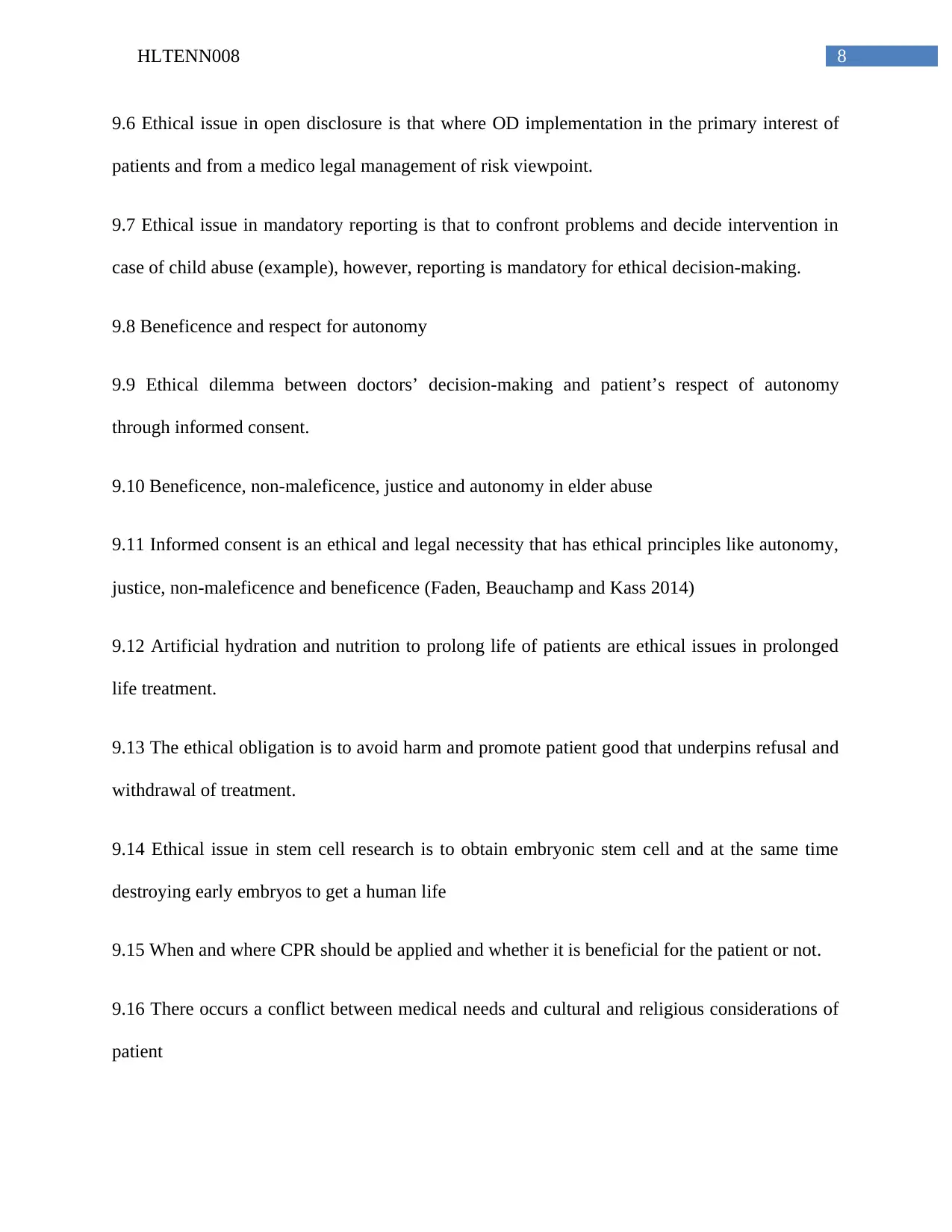
8HLTENN008
9.6 Ethical issue in open disclosure is that where OD implementation in the primary interest of
patients and from a medico legal management of risk viewpoint.
9.7 Ethical issue in mandatory reporting is that to confront problems and decide intervention in
case of child abuse (example), however, reporting is mandatory for ethical decision-making.
9.8 Beneficence and respect for autonomy
9.9 Ethical dilemma between doctors’ decision-making and patient’s respect of autonomy
through informed consent.
9.10 Beneficence, non-maleficence, justice and autonomy in elder abuse
9.11 Informed consent is an ethical and legal necessity that has ethical principles like autonomy,
justice, non-maleficence and beneficence (Faden, Beauchamp and Kass 2014)
9.12 Artificial hydration and nutrition to prolong life of patients are ethical issues in prolonged
life treatment.
9.13 The ethical obligation is to avoid harm and promote patient good that underpins refusal and
withdrawal of treatment.
9.14 Ethical issue in stem cell research is to obtain embryonic stem cell and at the same time
destroying early embryos to get a human life
9.15 When and where CPR should be applied and whether it is beneficial for the patient or not.
9.16 There occurs a conflict between medical needs and cultural and religious considerations of
patient
9.6 Ethical issue in open disclosure is that where OD implementation in the primary interest of
patients and from a medico legal management of risk viewpoint.
9.7 Ethical issue in mandatory reporting is that to confront problems and decide intervention in
case of child abuse (example), however, reporting is mandatory for ethical decision-making.
9.8 Beneficence and respect for autonomy
9.9 Ethical dilemma between doctors’ decision-making and patient’s respect of autonomy
through informed consent.
9.10 Beneficence, non-maleficence, justice and autonomy in elder abuse
9.11 Informed consent is an ethical and legal necessity that has ethical principles like autonomy,
justice, non-maleficence and beneficence (Faden, Beauchamp and Kass 2014)
9.12 Artificial hydration and nutrition to prolong life of patients are ethical issues in prolonged
life treatment.
9.13 The ethical obligation is to avoid harm and promote patient good that underpins refusal and
withdrawal of treatment.
9.14 Ethical issue in stem cell research is to obtain embryonic stem cell and at the same time
destroying early embryos to get a human life
9.15 When and where CPR should be applied and whether it is beneficial for the patient or not.
9.16 There occurs a conflict between medical needs and cultural and religious considerations of
patient
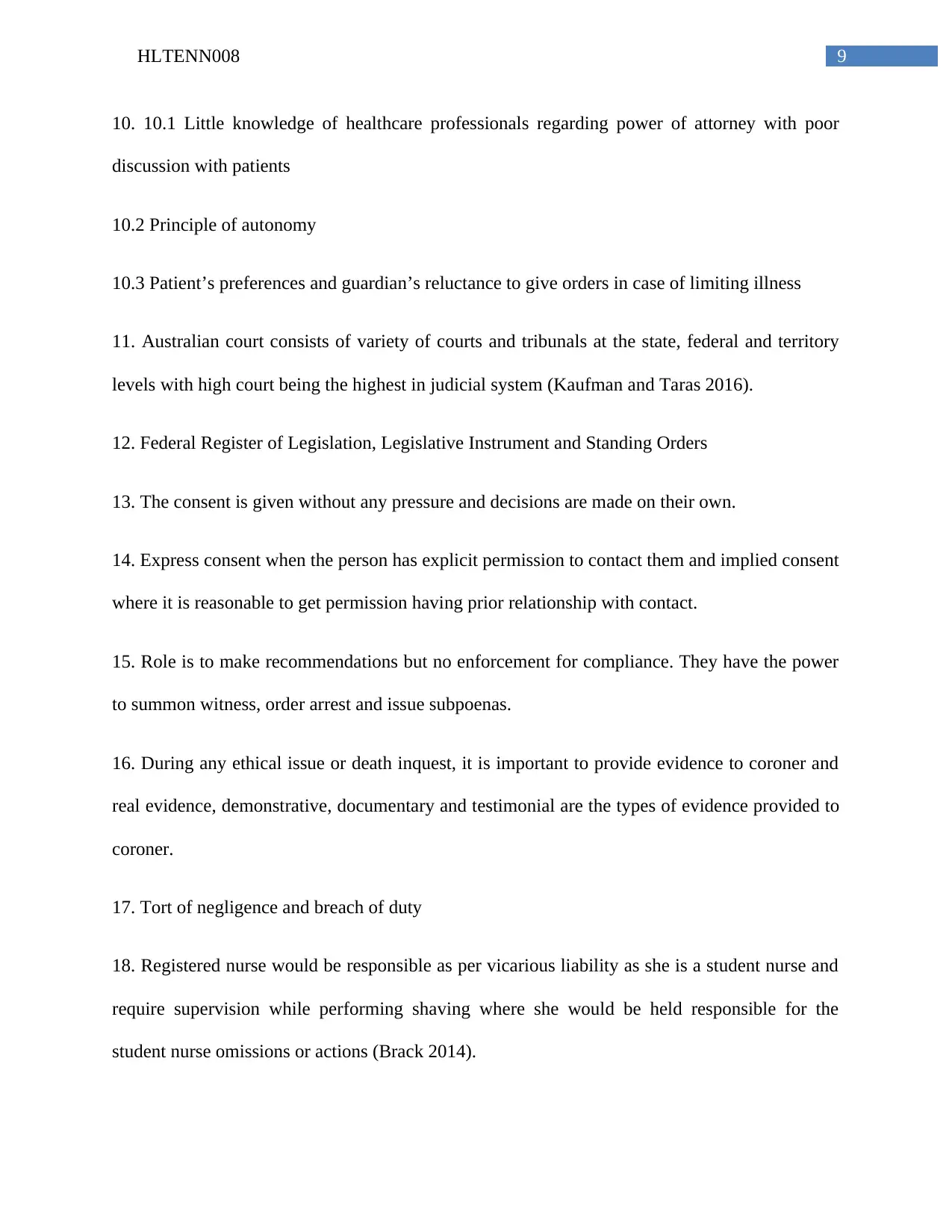
9HLTENN008
10. 10.1 Little knowledge of healthcare professionals regarding power of attorney with poor
discussion with patients
10.2 Principle of autonomy
10.3 Patient’s preferences and guardian’s reluctance to give orders in case of limiting illness
11. Australian court consists of variety of courts and tribunals at the state, federal and territory
levels with high court being the highest in judicial system (Kaufman and Taras 2016).
12. Federal Register of Legislation, Legislative Instrument and Standing Orders
13. The consent is given without any pressure and decisions are made on their own.
14. Express consent when the person has explicit permission to contact them and implied consent
where it is reasonable to get permission having prior relationship with contact.
15. Role is to make recommendations but no enforcement for compliance. They have the power
to summon witness, order arrest and issue subpoenas.
16. During any ethical issue or death inquest, it is important to provide evidence to coroner and
real evidence, demonstrative, documentary and testimonial are the types of evidence provided to
coroner.
17. Tort of negligence and breach of duty
18. Registered nurse would be responsible as per vicarious liability as she is a student nurse and
require supervision while performing shaving where she would be held responsible for the
student nurse omissions or actions (Brack 2014).
10. 10.1 Little knowledge of healthcare professionals regarding power of attorney with poor
discussion with patients
10.2 Principle of autonomy
10.3 Patient’s preferences and guardian’s reluctance to give orders in case of limiting illness
11. Australian court consists of variety of courts and tribunals at the state, federal and territory
levels with high court being the highest in judicial system (Kaufman and Taras 2016).
12. Federal Register of Legislation, Legislative Instrument and Standing Orders
13. The consent is given without any pressure and decisions are made on their own.
14. Express consent when the person has explicit permission to contact them and implied consent
where it is reasonable to get permission having prior relationship with contact.
15. Role is to make recommendations but no enforcement for compliance. They have the power
to summon witness, order arrest and issue subpoenas.
16. During any ethical issue or death inquest, it is important to provide evidence to coroner and
real evidence, demonstrative, documentary and testimonial are the types of evidence provided to
coroner.
17. Tort of negligence and breach of duty
18. Registered nurse would be responsible as per vicarious liability as she is a student nurse and
require supervision while performing shaving where she would be held responsible for the
student nurse omissions or actions (Brack 2014).
Secure Best Marks with AI Grader
Need help grading? Try our AI Grader for instant feedback on your assignments.
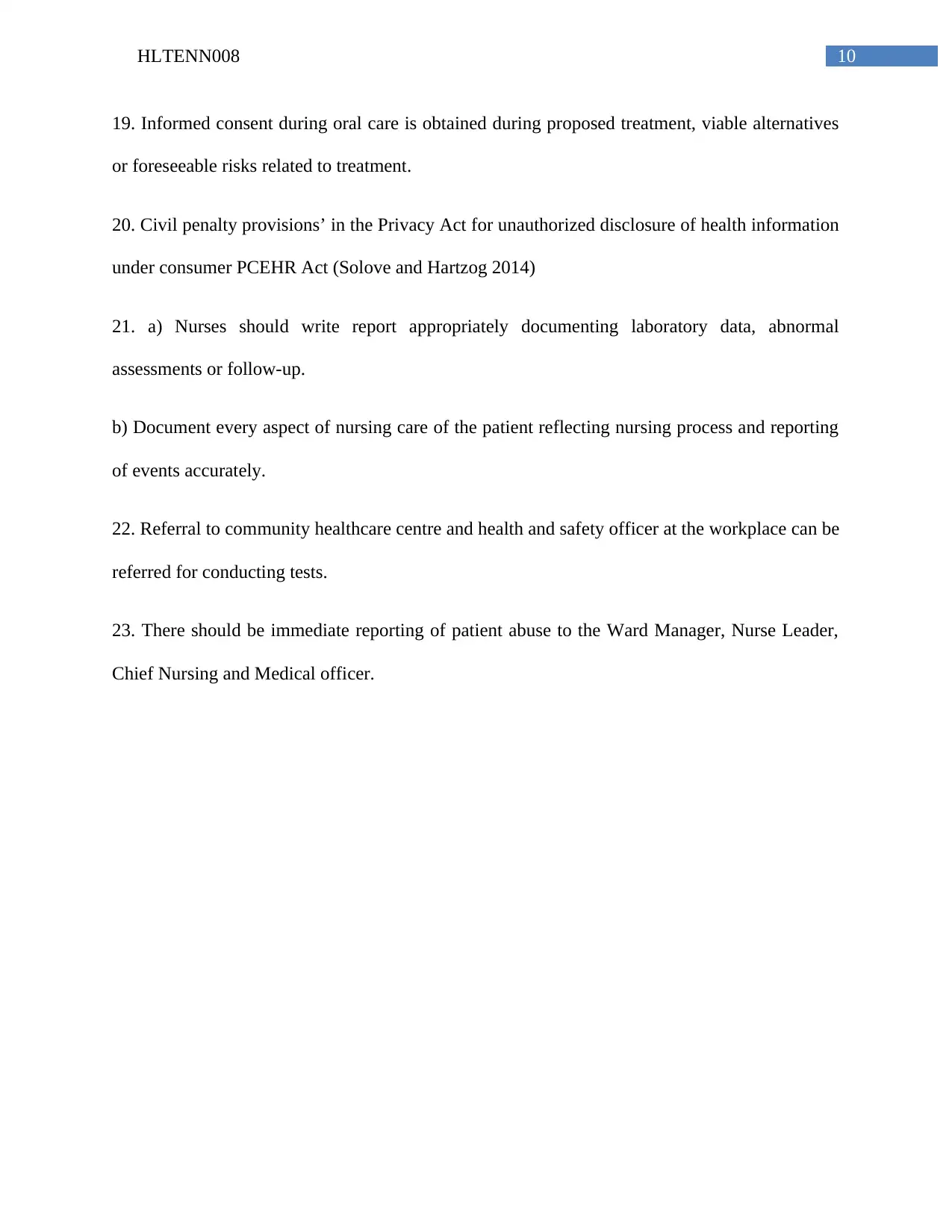
10HLTENN008
19. Informed consent during oral care is obtained during proposed treatment, viable alternatives
or foreseeable risks related to treatment.
20. Civil penalty provisions’ in the Privacy Act for unauthorized disclosure of health information
under consumer PCEHR Act (Solove and Hartzog 2014)
21. a) Nurses should write report appropriately documenting laboratory data, abnormal
assessments or follow-up.
b) Document every aspect of nursing care of the patient reflecting nursing process and reporting
of events accurately.
22. Referral to community healthcare centre and health and safety officer at the workplace can be
referred for conducting tests.
23. There should be immediate reporting of patient abuse to the Ward Manager, Nurse Leader,
Chief Nursing and Medical officer.
19. Informed consent during oral care is obtained during proposed treatment, viable alternatives
or foreseeable risks related to treatment.
20. Civil penalty provisions’ in the Privacy Act for unauthorized disclosure of health information
under consumer PCEHR Act (Solove and Hartzog 2014)
21. a) Nurses should write report appropriately documenting laboratory data, abnormal
assessments or follow-up.
b) Document every aspect of nursing care of the patient reflecting nursing process and reporting
of events accurately.
22. Referral to community healthcare centre and health and safety officer at the workplace can be
referred for conducting tests.
23. There should be immediate reporting of patient abuse to the Ward Manager, Nurse Leader,
Chief Nursing and Medical officer.
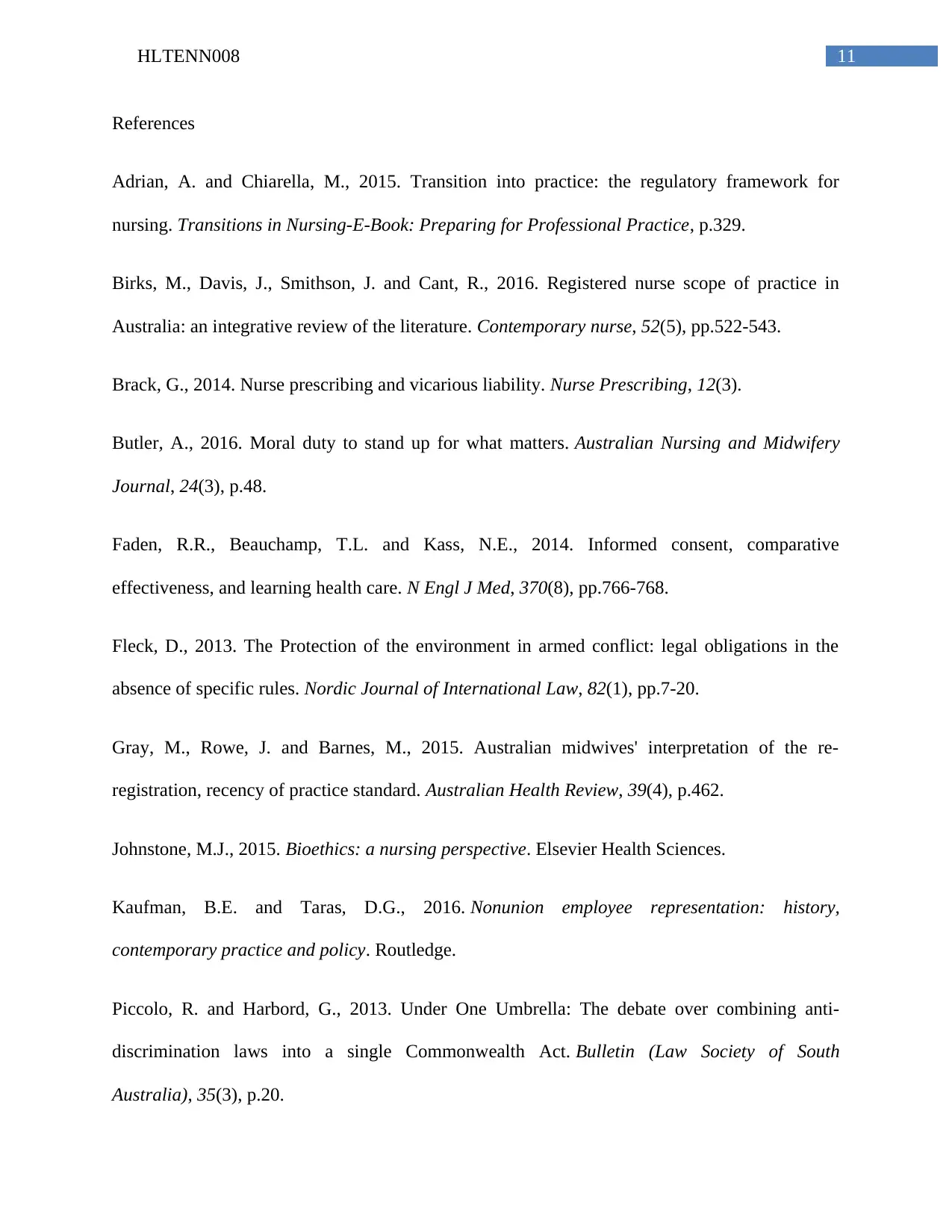
11HLTENN008
References
Adrian, A. and Chiarella, M., 2015. Transition into practice: the regulatory framework for
nursing. Transitions in Nursing-E-Book: Preparing for Professional Practice, p.329.
Birks, M., Davis, J., Smithson, J. and Cant, R., 2016. Registered nurse scope of practice in
Australia: an integrative review of the literature. Contemporary nurse, 52(5), pp.522-543.
Brack, G., 2014. Nurse prescribing and vicarious liability. Nurse Prescribing, 12(3).
Butler, A., 2016. Moral duty to stand up for what matters. Australian Nursing and Midwifery
Journal, 24(3), p.48.
Faden, R.R., Beauchamp, T.L. and Kass, N.E., 2014. Informed consent, comparative
effectiveness, and learning health care. N Engl J Med, 370(8), pp.766-768.
Fleck, D., 2013. The Protection of the environment in armed conflict: legal obligations in the
absence of specific rules. Nordic Journal of International Law, 82(1), pp.7-20.
Gray, M., Rowe, J. and Barnes, M., 2015. Australian midwives' interpretation of the re-
registration, recency of practice standard. Australian Health Review, 39(4), p.462.
Johnstone, M.J., 2015. Bioethics: a nursing perspective. Elsevier Health Sciences.
Kaufman, B.E. and Taras, D.G., 2016. Nonunion employee representation: history,
contemporary practice and policy. Routledge.
Piccolo, R. and Harbord, G., 2013. Under One Umbrella: The debate over combining anti-
discrimination laws into a single Commonwealth Act. Bulletin (Law Society of South
Australia), 35(3), p.20.
References
Adrian, A. and Chiarella, M., 2015. Transition into practice: the regulatory framework for
nursing. Transitions in Nursing-E-Book: Preparing for Professional Practice, p.329.
Birks, M., Davis, J., Smithson, J. and Cant, R., 2016. Registered nurse scope of practice in
Australia: an integrative review of the literature. Contemporary nurse, 52(5), pp.522-543.
Brack, G., 2014. Nurse prescribing and vicarious liability. Nurse Prescribing, 12(3).
Butler, A., 2016. Moral duty to stand up for what matters. Australian Nursing and Midwifery
Journal, 24(3), p.48.
Faden, R.R., Beauchamp, T.L. and Kass, N.E., 2014. Informed consent, comparative
effectiveness, and learning health care. N Engl J Med, 370(8), pp.766-768.
Fleck, D., 2013. The Protection of the environment in armed conflict: legal obligations in the
absence of specific rules. Nordic Journal of International Law, 82(1), pp.7-20.
Gray, M., Rowe, J. and Barnes, M., 2015. Australian midwives' interpretation of the re-
registration, recency of practice standard. Australian Health Review, 39(4), p.462.
Johnstone, M.J., 2015. Bioethics: a nursing perspective. Elsevier Health Sciences.
Kaufman, B.E. and Taras, D.G., 2016. Nonunion employee representation: history,
contemporary practice and policy. Routledge.
Piccolo, R. and Harbord, G., 2013. Under One Umbrella: The debate over combining anti-
discrimination laws into a single Commonwealth Act. Bulletin (Law Society of South
Australia), 35(3), p.20.
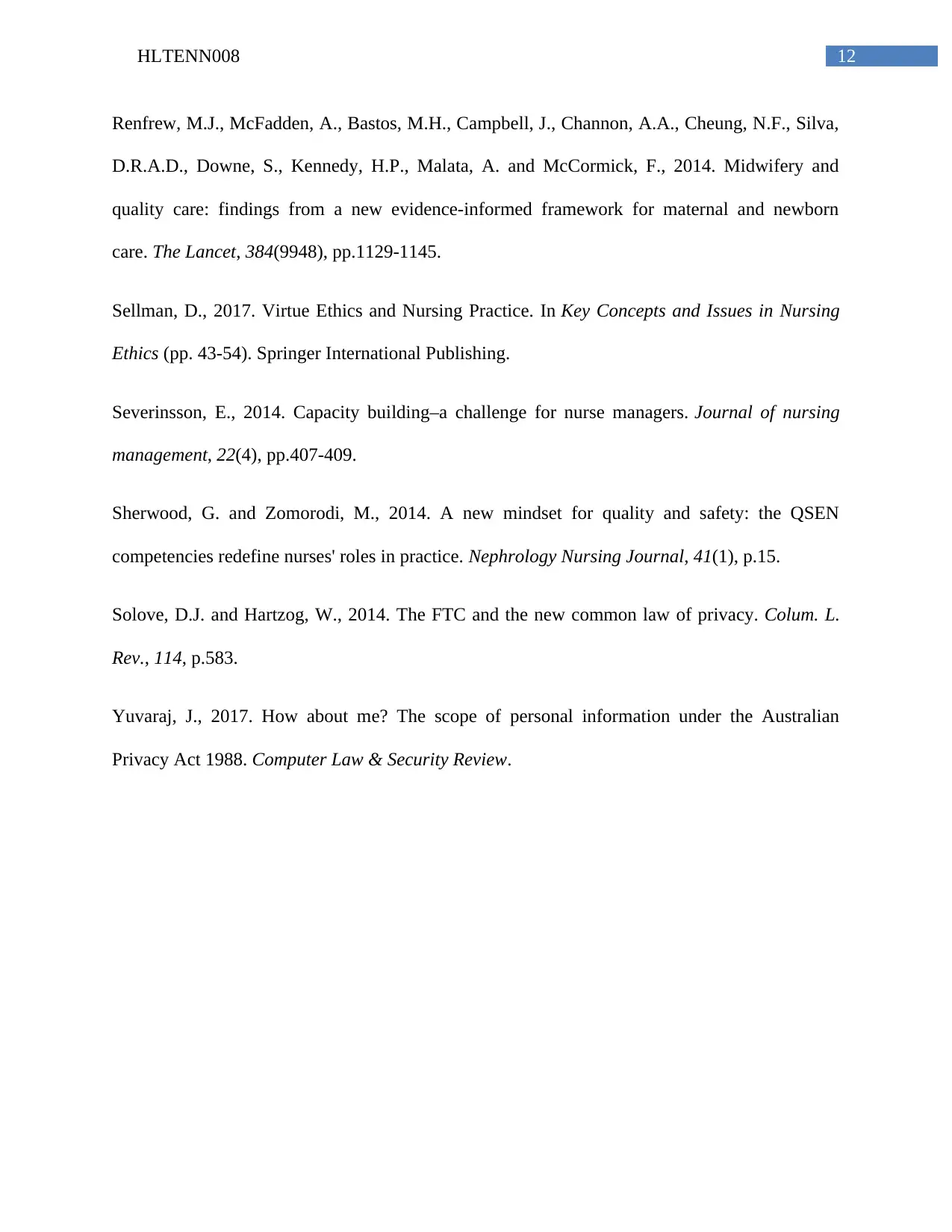
12HLTENN008
Renfrew, M.J., McFadden, A., Bastos, M.H., Campbell, J., Channon, A.A., Cheung, N.F., Silva,
D.R.A.D., Downe, S., Kennedy, H.P., Malata, A. and McCormick, F., 2014. Midwifery and
quality care: findings from a new evidence-informed framework for maternal and newborn
care. The Lancet, 384(9948), pp.1129-1145.
Sellman, D., 2017. Virtue Ethics and Nursing Practice. In Key Concepts and Issues in Nursing
Ethics (pp. 43-54). Springer International Publishing.
Severinsson, E., 2014. Capacity building–a challenge for nurse managers. Journal of nursing
management, 22(4), pp.407-409.
Sherwood, G. and Zomorodi, M., 2014. A new mindset for quality and safety: the QSEN
competencies redefine nurses' roles in practice. Nephrology Nursing Journal, 41(1), p.15.
Solove, D.J. and Hartzog, W., 2014. The FTC and the new common law of privacy. Colum. L.
Rev., 114, p.583.
Yuvaraj, J., 2017. How about me? The scope of personal information under the Australian
Privacy Act 1988. Computer Law & Security Review.
Renfrew, M.J., McFadden, A., Bastos, M.H., Campbell, J., Channon, A.A., Cheung, N.F., Silva,
D.R.A.D., Downe, S., Kennedy, H.P., Malata, A. and McCormick, F., 2014. Midwifery and
quality care: findings from a new evidence-informed framework for maternal and newborn
care. The Lancet, 384(9948), pp.1129-1145.
Sellman, D., 2017. Virtue Ethics and Nursing Practice. In Key Concepts and Issues in Nursing
Ethics (pp. 43-54). Springer International Publishing.
Severinsson, E., 2014. Capacity building–a challenge for nurse managers. Journal of nursing
management, 22(4), pp.407-409.
Sherwood, G. and Zomorodi, M., 2014. A new mindset for quality and safety: the QSEN
competencies redefine nurses' roles in practice. Nephrology Nursing Journal, 41(1), p.15.
Solove, D.J. and Hartzog, W., 2014. The FTC and the new common law of privacy. Colum. L.
Rev., 114, p.583.
Yuvaraj, J., 2017. How about me? The scope of personal information under the Australian
Privacy Act 1988. Computer Law & Security Review.
1 out of 13
Related Documents
Your All-in-One AI-Powered Toolkit for Academic Success.
+13062052269
info@desklib.com
Available 24*7 on WhatsApp / Email
![[object Object]](/_next/static/media/star-bottom.7253800d.svg)
Unlock your academic potential
© 2024 | Zucol Services PVT LTD | All rights reserved.





